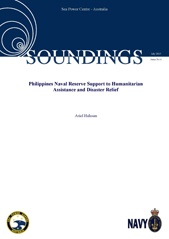Soundings Papers: Philippines Naval Reserve support to Humanitarian Assistance and Disaster Relief

PDF : 488.58 KB
As one of the countries most vulnerable to the effects of climate change, The Philippines faces numerous natural hazards which carry implications to national peace and security. As The Philippines will continue to encounter stronger typhoons, coupled with rising sea levels and heavy precipitation, there is a need to strengthen efforts to mitigate and/or respond to crises caused by these natural hazards. As climate change exacerbates existing pressures on national security issues by bringing these new challenges, the operational responsibilities of the Armed Forces of the Philippines (AFP) also expands in the event of large-scale climate-driven disasters.
Under this premise, the AFP will be involved in addressing the security issues associated with global warming, especially responding to natural hazards, for the foreseeable future. This paradigm shift will further complicate the ability of the AFP to operate across the spectrum of operations with its limited resources and may even tip the scale towards its non-traditional role of humanitarian assistance and disaster relief (HADR), rather than its traditional role of defending the nation’s territorial integrity and sovereignty.
However, the AFP and the Philippine Navy (PN) in particular, has the advantage of maintaining a reserve force that can be mobilised during war, rebellion, national emergency and when national security is in jeopardy, and that can be committed to support HADR operations and disaster risk reduction when necessary. But the reserve force as an integral part of the AFP has never been mobilised, especially during large-scale climate-driven disasters and notwithstanding that it is well organised and possesses talents, skills, expertise, experience and resources that can supplement and complement AFP/PN capabilities. Hence, this paper proposes legal and policy amendments to establish quick-effective mobilisation of the reserve force during HADR operations.


